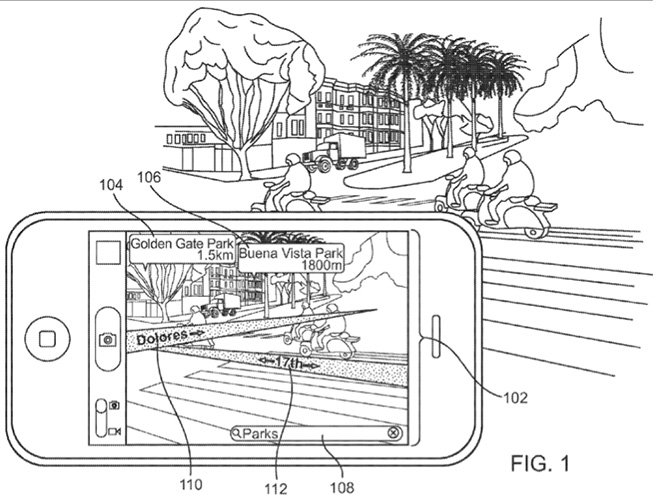Through a series of acquisitions, Apple has a considerably large staff dedicated to experimental virtual reality and augmented reality projects, some of whom are reportedly working on prototype headset configurations that could one day compete with the likes of Facebook's Oculus Rift.

Apple patent illustrating an augmented reality iPhone mapping app.
Details on Apple's apparent VR and AR initiatives were revealed on Friday by the Financial Times, which indicated that Apple has been building prototype headsets for "several months." The report also revealed that Apple had acquired a company called Flyby Media, an augmented reality firm that had previously worked closely with Google.
Apple's interest in virtual and augmented reality is no secret, as a number of acquisitions and patent applications fall directly into those fields. But the fact that the company has allegedly experimented with building prototype hardware headsets, the likes of which could compete with Oculus or Microsoft Hololens or even Google Glass, may come as a surprise.
The revelations also come only a few days after Apple Chief Executive Tim Cook was asked about his thoughts on virtual reality. In brief comments made during his company's quarterly earnings conference call, Cook said he thought VR is "cool," and suggested it won't be a niche product as it matures.
In terms of acquisitions, Apple purchased German augmented reality firm Metaio in May of last year. And in 2013, Apple also purchased PrimeSense, which collaborated with Microsoft for the first-generation Kinect hardware for Xbox 360. Then, last November, Apple confirmed it acquired motion capture firm Faceshift, whose technology is capable of rendering human-like gestures onto the faces of virtual characters.
Apple also holds a variety of patents covering a wide gamut of augmented reality applications, including transparent displays, mobile mapping solutions and iPhone-powered virtual displays. One particularly interesting property details a smartphone that can identify physical objects in real time using computer vision.
Source: Microsoft
Rumors first cropped up last March suggesting that Apple has a small team tasked with experimental work in the field of augmented reality. But Friday's report would suggest that since that time, Apple's team devoted to the new technology has grown considerably, whether just through acquisitions or otherwise.
Augmented reality is a layer of digital information overlaid onto the physical world, allowing information such as instantly accessible navigation directions in the user's field of view. The most well-known implementation of AR is Google Glass.
iPhone users can get a very basic taste of virtual reality thanks to the Google Cardboard project, which turns a handset into a cheap and easy way to test out VR apps available on the App Store. AppleInsider's comprehensive roundup of the best virtual reality apps for iPhone can help you get started.

